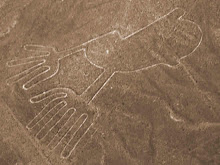Brenner Pass in sunshine.

Traffic jam and heavy rain at the German border
 It was dusk at this time and with the low lying clouds and the rain, the road to Oberaudorf was surreal in its beauty. It wound up, down, and around small hills, through trees and fields, and small hamlets. The rain continued to fall as we arrived in Oberaudorf and the first sight that greeted us was an old Bavarian man, pushing an equally ancient bicycle, dressed in traditional leather knickers which were filthy. Arlette was in heaven and proudly pointed out this gentleman as proof that the Bavarians are the acme of western civilization. What crusty leather pants have to do with man’s ascendance from savagery I have no idea. But, Arlette is one of the most brilliant persons I have ever known, if not a little whacko (being whacko must be a genetic trait in my family so my kids and friends would tell me. Except my kids would say that it stops with me since they are obviously superior to me in every way. Punk kids.), so I will take her word for it.
It was dusk at this time and with the low lying clouds and the rain, the road to Oberaudorf was surreal in its beauty. It wound up, down, and around small hills, through trees and fields, and small hamlets. The rain continued to fall as we arrived in Oberaudorf and the first sight that greeted us was an old Bavarian man, pushing an equally ancient bicycle, dressed in traditional leather knickers which were filthy. Arlette was in heaven and proudly pointed out this gentleman as proof that the Bavarians are the acme of western civilization. What crusty leather pants have to do with man’s ascendance from savagery I have no idea. But, Arlette is one of the most brilliant persons I have ever known, if not a little whacko (being whacko must be a genetic trait in my family so my kids and friends would tell me. Except my kids would say that it stops with me since they are obviously superior to me in every way. Punk kids.), so I will take her word for it.
We ate at the Alpen Rose restaurant across the street from the hotel and the meal was okay but not spectacular. Arlette soon realized that she was the only person besides the server dressed in a Bavarian fashion. I feel a little bad for her because I think she is slowly realizing that her world is no longer in existence. She remembers things as they were before 1968 when social revolutions started to change the face of Europe. The typical greeting in Bavaria is “Grüße Gott” But aside from the hostess greeting us that way, the Germans we met entering any restaurant or place of business never said that to us (The one exception was a very old lady at a gas station who was definitely “old school”). Unlike in Austria, but I will get to that later.
The Alpen Rose with church behind. Visitor's Bureau guaranteeing the true local experience. Notice the McDonalds sign.
Visitor's Bureau guaranteeing the true local experience. Notice the McDonalds sign. The local bank
The local bank We left Oberaudorf to low lying clouds and rain and headed up the road to Salzburg, Austria.
We left Oberaudorf to low lying clouds and rain and headed up the road to Salzburg, Austria. I got into a fast driving line of cars that included a couple of seven series Beemers and one Maserati. I loved the fact that as we were heading to Salzburg, the birthplace of Wolfgang Amadeus Mozart, I was listening to a symphony from the exhaust of the Maserati. Italians may not be able to keep a government in place for more than 6 months and their cars have a reputation, in the US at least, of being suspect in reliability. But, they certainly put passion and a sense of beauty into all their creations. American cars have exhausts that are silent and blah or are brutal and try to overpower you with their “studliness.” The Maserati's exhaust note was mellow, yet powerful at low RPMs, but as the driver got on song with the throttle, the exhaust became this wonderful mix of speed, power, and desire for covering huge amounts of road quickly. *sigh*
I got into a fast driving line of cars that included a couple of seven series Beemers and one Maserati. I loved the fact that as we were heading to Salzburg, the birthplace of Wolfgang Amadeus Mozart, I was listening to a symphony from the exhaust of the Maserati. Italians may not be able to keep a government in place for more than 6 months and their cars have a reputation, in the US at least, of being suspect in reliability. But, they certainly put passion and a sense of beauty into all their creations. American cars have exhausts that are silent and blah or are brutal and try to overpower you with their “studliness.” The Maserati's exhaust note was mellow, yet powerful at low RPMs, but as the driver got on song with the throttle, the exhaust became this wonderful mix of speed, power, and desire for covering huge amounts of road quickly. *sigh*  As we walked into the restaurant/bar, it felt like we were in a Clint Eastwood movie. All conversation stopped, the piano player stopped playing (just kidding), and all heads turned and stared at us. Then, all at once, everyone smiled and exclaimed, “Grüße Gott”. The bartender seated us in a small side area where only one very old man was seated with a half liter of beer and some munchies (“schnibbles” as a friend would say) in front of him. He looked up and with a serious tone greeted us politely. As we ordered our meals and some decent local brew (Stiegl) I could tell he was trying to listen in on our conversation. But not in a nosy way, just through curiosity for strangers being in the pub, so to speak. After he finished his meal he stood up, grabbed his hat and coat, and asked us in German where we were from. Arlette responded in German that we were from France and Arizona. He then asked us in broken English if we knew Tucson, which he pronounced “Tuckson.” I answered that I was born in Tucson. At this point he stood up a little taller, slapped his chest proudly and loudly exclaimed, “I was prisoner of war near Tuckson.” It turned out that he had been in Rommel’s army in North Africa in 1943 working clearing mine fields when he was captured by Patton’s army. He then stayed in several camps throughout the US until 1946 as a POW. He said Arizona was the best place he had been interned and still had a piece of cotton saved as a memento of his time as a prisoner.
As we walked into the restaurant/bar, it felt like we were in a Clint Eastwood movie. All conversation stopped, the piano player stopped playing (just kidding), and all heads turned and stared at us. Then, all at once, everyone smiled and exclaimed, “Grüße Gott”. The bartender seated us in a small side area where only one very old man was seated with a half liter of beer and some munchies (“schnibbles” as a friend would say) in front of him. He looked up and with a serious tone greeted us politely. As we ordered our meals and some decent local brew (Stiegl) I could tell he was trying to listen in on our conversation. But not in a nosy way, just through curiosity for strangers being in the pub, so to speak. After he finished his meal he stood up, grabbed his hat and coat, and asked us in German where we were from. Arlette responded in German that we were from France and Arizona. He then asked us in broken English if we knew Tucson, which he pronounced “Tuckson.” I answered that I was born in Tucson. At this point he stood up a little taller, slapped his chest proudly and loudly exclaimed, “I was prisoner of war near Tuckson.” It turned out that he had been in Rommel’s army in North Africa in 1943 working clearing mine fields when he was captured by Patton’s army. He then stayed in several camps throughout the US until 1946 as a POW. He said Arizona was the best place he had been interned and still had a piece of cotton saved as a memento of his time as a prisoner. 
 Here's Arlette proving her street cred by flashing a gang sign in front of the house where Mozart lived.
Here's Arlette proving her street cred by flashing a gang sign in front of the house where Mozart lived.  Next time, “Wallgau. Where the inhabitants make the French look like St Francis of Assisi.”
Next time, “Wallgau. Where the inhabitants make the French look like St Francis of Assisi.”




1 comment:
Great pix as usual. Arlette looks great! I couldn't zoom in to really see her but she looks good. Is that a three fingered moment?
Post a Comment